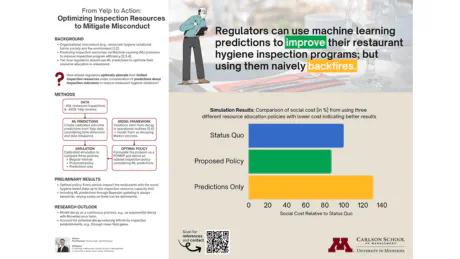From Yelp to Action: Optimizing Inspection Resources to Mitigate Misconduct

In my third essay, we explore how regulators can optimize the allocation of inspection resources to prevent restaurant hygiene violations. Violating regulatory standards, particularly in the context of restaurant hygiene is a well-established form of misconduct with tangible societal costs. Such violations result in numerous foodborne illnesses, hospitalizations, and deaths annually in the U.S. Regular inspections by health departments are key to maintaining hygiene standards, but limited resources constrain their frequency. Here, we examine whether incorporating machine learning predictions into the inspection scheduling process can optimize the allocation of inspectors and prevent such violations.
To answer this question, we use a multi-method approach. First, we model the occurrence of hygiene violations as a partially observable Markov process based on the understanding that misconduct can be the result of decay in adherence to operational routines. Then, we derive an optimal inspection policy that integrates machine learning predictions. Next, we validate the model using simulations on data about Yelp customer reviews and inspection outcomes for over 2000 Las Vegas restaurants from 2012 to 2019. This work demonstrates how machine learning can be effectively employed to improve inspection resource allocations to prevent misconduct, a novel approach in the context of regulatory inspections.